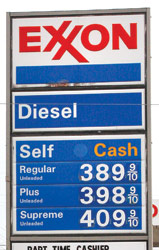Ever since gas prices spiked, the phone lines at Altech-Eco Energy Corp. have been burning up. “I do not have enough time to field all the calls,” says Par Neiburger, who works in sales and customer relations for the company. As he speaks, a phone can be heard ringing in the background. “Everyone who calls wants to convert to CNG.”

Altech-Eco sells compressed natural gas, currently priced at $1.90 per gas-gallon equivalent in Asheville. The company says it’s capable of safely converting any vehicle to run on the clean-burning alternative fuel—or making any car a bi-fuel vehicle, allowing drivers to pump either gasoline or CNG. Skyrocketing gasoline prices could spell success for the Arden-based facility—but there’s a catch.
“The EPA has basically made it impossible for us to do this,” says Neiburger. “My phone rings off the hook all day long, and I have to tell everybody no. Everyone. It’s the most frustrating position I think I’ve ever been in.”
Compressed natural gas is sold locally in Arden and downtown Asheville, and it’s available to anyone who buys a brand-new CNG vehicle. But red tape blocks most motorists from legally converting their existing vehicles.
That’s because the Environmental Protection Agency requires the use of agency-certified conversion kits—but they’re available only for a very limited number of makes and models. (If you have a 2008 Ford Focus, you’re in luck.) Kit manufacturers can apply to have their products certified, but the elaborate process discourages most CNG specialists from ever trying. It requires high-tech, rigorous emissions testing, five or six rounds of data review, and the overall cost can total $50,000. And once the EPA has given the nod for a particular vehicle, the certificate expires at the end of the year—regardless of when it was issued. To renew it, there’s an additional $10,000 fee.
That puts Altech-Eco in the unfortunate position of having to turn away would-be customers eager to make the switch, even though it has the technical capability to perform professional conversionsto CNG. “Having such strict restrictions is causing a groundswell of illegal conversions,” says Neiburger. “These kits are antiquated, low-quality and it is not safe for an average person to do this, regardless of what the Web site is claiming.” Meanwhile, Altech-Eco’s lifeline is fleet managers, who can buy brand-new vehicles in bulk and thus gain a quicker return on their investment.
Performing a conversion without EPA approval could result in a fine of more than $5,000 per vehicle per day, according to Natural Gas Vehicles for America, a trade association. “We’re not willing to risk it,” says Neiburger. “We want to work with the EPA, not against them. But we need their help in changing their policies.”
Stephe Yborra, NGV America’s director of marketing and communications, says his group generally works well with EPA staff. “The concern we have is that some of the requirements to meet the certification seem to be overly burdensome … technically [and] financially. Even if a company does really well … you’re still creating a burden of cost that’s just phenomenal.” As a result, says Yborra, Altech-Eco is “trying to promote cleaner vehicles running on American fuel, but they’re doing it with their hands tied behind their back.” Yborra says his organization typically receives some 150 calls a week from people interested in conversion. He usually directs them to an online fact sheet, which concludes with this message: “Please do not call us to ask why an EPA certification is not available for your vehicle or why the certification process is so technically challenging or expensive. We have no authority/jurisdiction over the process, nor do we have any influence in these policies.”
“Whenever there’s a new type of vehicle introduced, it has to go through the emission-testing process,” explains Kathy Moulin, an EPA public-relations officer. “We have to make sure that it doesn’t increase pollution.” Moulin said she didn’t have details about the cost of emissions testing.
The idea of running cars on CNG is hardly new: A 1990 EPA report details the feasibility of large-scale domestic use. Featuring diagrams for vehicle conversion and detailed charts outlining the fuel’s environmental and economic benefits, it references CNG emissions tests from the 1980s and notes that home fueling stations could be installed. “If dedicated, optimized CNG vehicles are considered, then there is no reason why such a … vehicle could not be competitive with today’s gasoline-fueled cars,” the report notes.
Gas was less than $2 per gallon when that report was issued; today, it’s twice as much. “I’ve got people literally calling me crying on the phone because they’re going out of business because they can’t afford gasoline prices,” says Neiburger, who drives a bi-fuel company car. When he fills up with CNG, it costs $15. But he recently filled up with gasoline instead—and ended up spending $75. “I nearly fainted,” he says.



Interesting. And this bit of exciting technology news, coupled with more bureaucratic impediments:
“Edward Furia says the electric car technology his Bellevue-based firm, AFS Trinity Power Corp., has developed could end the United States’ dependence on oil.
AFS Trinity’s prototype sport utility vehicles can go 40 miles on a single charge from a standard electric outlet, at which point a gas-powered engine takes over. The SUVs reach top speeds of 90 mph on the highway — and accelerate without a hitch…”
“They can go 40 miles for a dollar, for a dollar,” Furia shouted, referring to the cost of power.”
“…there is a “lot of institutional resistance” in the U.S.
After all, to choose just one example, he said, an electric car would need little maintenance — a big moneymaker for car manufacturers.”
http://www.hispanicbusiness.com/news/2008/6/3/they_can_go_40_miles_for.htm
th members of congress should all be fired for their lack of an energy plan. epa is certainly striving to to emulate their congressional heros…..these people are becoming a national and worlwide joke…….